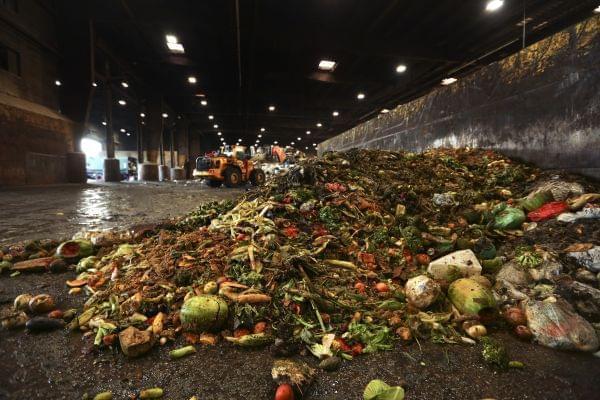Cutting Down On Food Waste; Non-Fiction Reading Recommendations; Bilingual Early Childhood Education

In this Aug. 29, 2018, photo, at the Waste Management facility in North Brooklyn, tons of leftover food sits piled up before being processed into "bio-slurry," in New York. AP Photo/Stephen Groves
Food industry groups want to change the “sell by” and “use by” dates on products in order to cut down on food waste. We talk about how to know when something is really expired, and how we can reduce food waste in our own kitchens. Plus, we’ll continue our weeklong series on summer reading with some non-fiction recommendations. And, if you’re trying to learn a new language, you should do it as early as possible. That’s part of the reason more daycares and early childhood centers are teaching kids in more than one language.
Imagine going to the grocery store, buying three bags of food, and throwing one of them straight into the trash.
One way or another, that’s essentially what happens in the US. The USDA says about a third of our country’s food supply is wasted each year - that’s on the order of 133 billion pounds!
How does it happen? Grocery stores toss produce that’s misshapen, but otherwise completely edible, and restaurants dump their leftovers at the end of the night.
There’s also one more huge reason: people throw out food that’s in their fridges and pantries because they don’t know whether it’s safe to eat.
To get some clarity on when food is actually expired and hear about some other ways we can keep food out of the garbage, we're joined by Bob Brackett, the director of the IIT Institute for Food Safety and Health, and Jeannine Kannegiesser with the Illinois Food Scrap Coalition and the Northern Illinois Foodbank.
Also in the studio is Brenna Ellison, a professor at the University of Illinois College of Agricultural, Consumer and Environmental Sciences.
"Just because the date has passed doesn't mean you can't still enjoy it... don't throw it away just because it's past the sell by date," says Jeannine Kannegiesser from @ILfoodbank.
— The 21st (@21stShow) July 2, 2019
Plus--
This week we’re getting recommendations from writers, bookstore owners, and librarians from all over the state. Yesterday we talked about fiction. Tomorrow, we’ll hear about kids and YA books. And today, we’re focusing on non-fiction, which is a big category, but we had lots of great tiles to talk about this morning.
To tell us more about some non-fiction books to read, we're joined by three public librarians from Illinois. Diana Sussman is the library director for the Carbondale Public Library. Sheri Bay is the adult services librarian for the Lincoln Library in Springfield. Carol Torrens is adult services manager for the Bloomington Public Library.
Diana Sussman recommends "Big Magic: Creative Living Beyond Fear" by Elizabeth Gilbert
— The 21st (@21stShow) July 2, 2019
"You can't get enough of it! She talks about how to live creatively and take on the creative projects you want to take on... it makes you feel more and more empowered"https://t.co/Ox6WsO1aLp
And--
If you’re trying to learn a new language, researchers say you should do it as early as possible. Even as early as the first year of life.
For that reason and others, many parents are turning to bilingual day care and early education programs for their toddlers and preschoolers.
Luisiana Meléndez is director of the bilingual program for the Erikson Institute, an education organization focusing on early childhood development. Professor Meléndez was also recently named to the Chicago Board of Education.
Martha Gonzalez is the executive director of the Multicultural Community Center in Rantoul, Ill. They provide daycare and after-school programs for kids 6 weeks to 12 years old.
Luke Scharf's 9 year old son, Ethan, is in the bilingual immersion program at Leal School in Urbana.
"Research shows that we're wired to learn multiple languages from birth," Luisiana Meléndez says. "When children are born, they can discriminate from any sound made by the human phonemic apparatus, but that ability starts narrowing to the languages that the child is exposed to."
— The 21st (@21stShow) July 2, 2019

